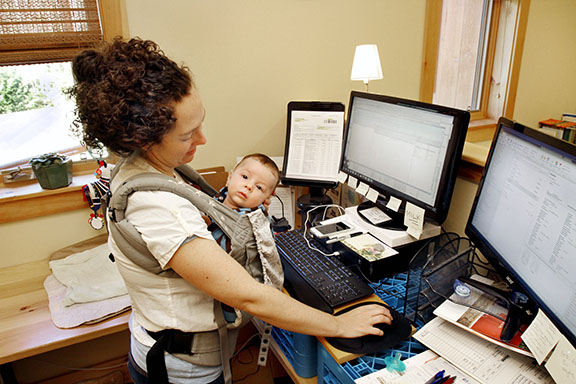 Christina Klueh and son Isaac who are part of the babies at work program. (Courtesy of W.S. Badger)
Christina Klueh and son Isaac who are part of the babies at work program. (Courtesy of W.S. Badger)
Many companies offer a three-month leave for the primary parent of a newborn. At W.S. Badger, an organic body care product manufacturer in Gilsum, the women-led management team extends that benefit by allowing parents to bring their babies to the office until they’re six months old or crawling.
A 3-month-old baby is still very young to be separated from their mother, says Emily Hall Warren, Badger’s director of administration. She adds that the Babies at Work program is a visible acknowledgment that first-time moms and dads often feel like their world has been turned upside down and lets them know the company is there to help them during this new transition period in their lives.
“It’s an important bonding time,” she says. It also helps build community within the workplace.
Aislinn Robinson is a mother of two toddlers and an infant. She wasn’t working at Badger when she had her first two children. When her third was born in late June, she took a paid leave and then took advantage of the Babies at Work program.
“In the past I’ve cut my maternity leave short to be able to go back and fill a position,” she says.
The company expects that parents participating in this program will be spending hours of the work day caring for a baby and not working full time, says Warren. They may have to temporarily modify their role at the company, she adds.
Robinson works in quality control evaluating raw materials. During the three months her son was a Badger baby, the practical constraints of the situation led her to dedicate more time to office work than to laboratory tasks.
As part of the agreement, parents of infants ask other employees to hold their babies if they need to attend a meeting, go into the lab or spend time on the phone.
“It’s a highly coveted position [baby holders],” says Warren, and often more people ask to hold the baby than the baby needs.
“A couple of members of my team even changed my baby’s diaper while I was in a meeting,” says Robinson. “That felt huge.”
Robinson says she had a built-in support system with her third child that she didn’t experience with the other two. At Badger, employees exchange parenting tips; new moms get advice from more experienced parents; sometimes one new parent will hand down the outgrown infant paraphernalia to the next new parent.
“When mothers in the workplace feel valued and have a community of other peers and managers that support mothers who need to pump or feed their baby, or change a diaper, they are more likely to want to hold on to that,” Robinson says.
Badger joins around 200 other companies in the country offering a similar benefit, according to the Parenting in the Workplace Institute.
For main Child Care Crisis Story click here.

 Current Issue - July 2024
Current Issue - July 2024